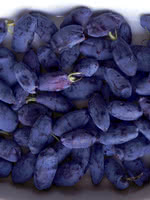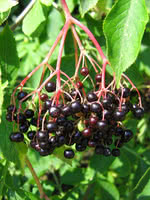Mon-Fri 9am - 5pm Mountain time
Honey Bee Haskap (Honeyberry) vs Black Elderberry
Lonicera caerulea Honey Bee
Sambucus canadensis
NOT AVAILABLE THIS SEASON - MIGHT RETURN
NOT AVAILABLE THIS SEASON - MIGHT RETURN
Honey Bee Haskap produces tarter fruit than the Aurora and Borealis varieties and is known for bearing fruit at a younger age. The flavour of Haskaps is generally described as a cross between a blueberry and a raspberry. Honey Bee Haskaps are well suited to fresh eating, freezing, baking, and preserves.
The Honey Bee Haskap has stronger fruit holds than other varieties so the berries stay on the bush longer. The berries do not roll well so they are not recommended for mechanical harvesting.
For optimal fruit production, cross-pollination is required. Haskaps need to be planted with a compatible variety. Compatibility is influenced by both bloom time and genetics.
Honey Bee Haskap is an early-pollinating variety and pairs well with Aurora, Borealis, Tundra, and Indigo Gem.
Black Elderberry is a deciduous shrub native to eastern North America. You can plant this shrub in moist areas and it will help stabilize your soil. You can also use it on rural properties anywhere you'd use a lilac.
Black Elderberries are considered to be partially self-pollinating. So while they will still produce some berries without cross-pollination, planting with another variety will increase yields. Consider planting with Ranch Elderberry or Bob Gordon Elderberry.
Warning: the seeds, stems, leaves, roots, and uncooked berries of the Black Elderberry are poisonous to humans when eaten in quantity. You should cook the berries to make them safe for human consumption.
Honey Bee Haskap (Honeyberry) Quick Facts
Black Elderberry Quick Facts
Toxicity: leaves, stems, and uncooked berries are poisonous to humans

